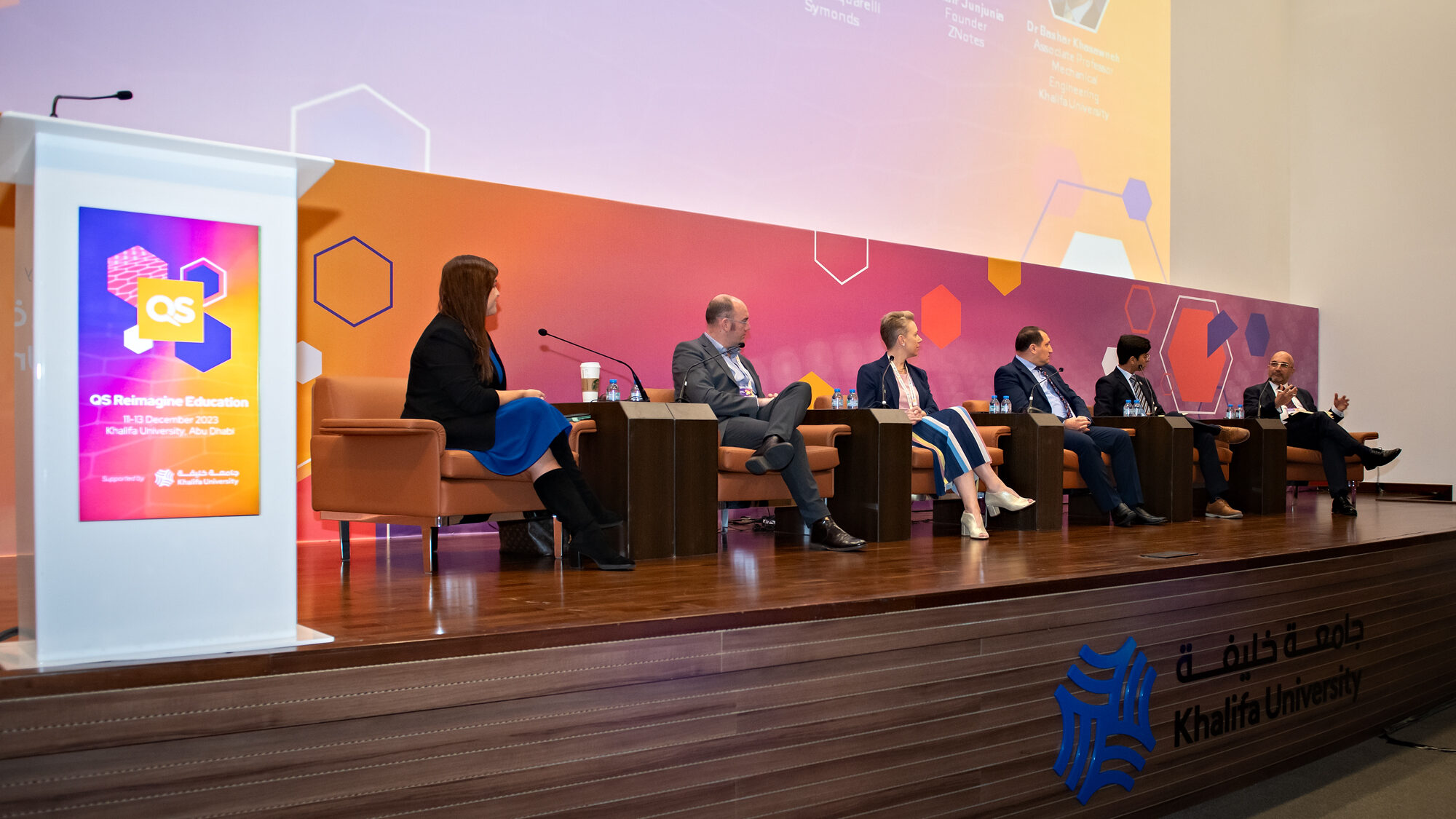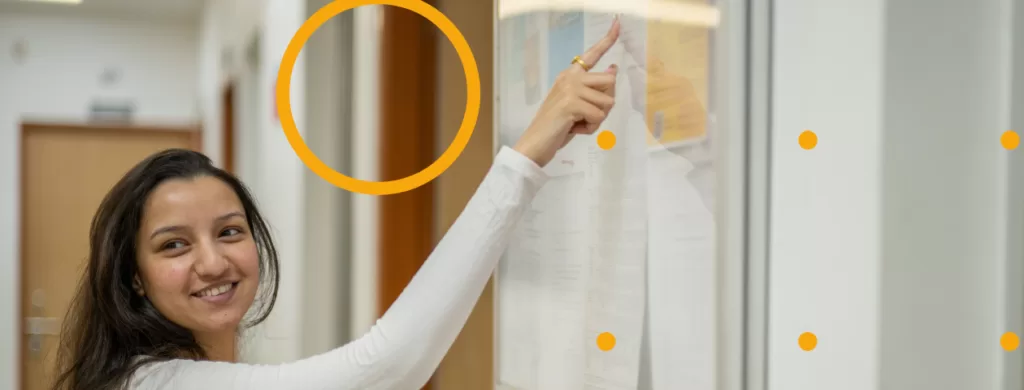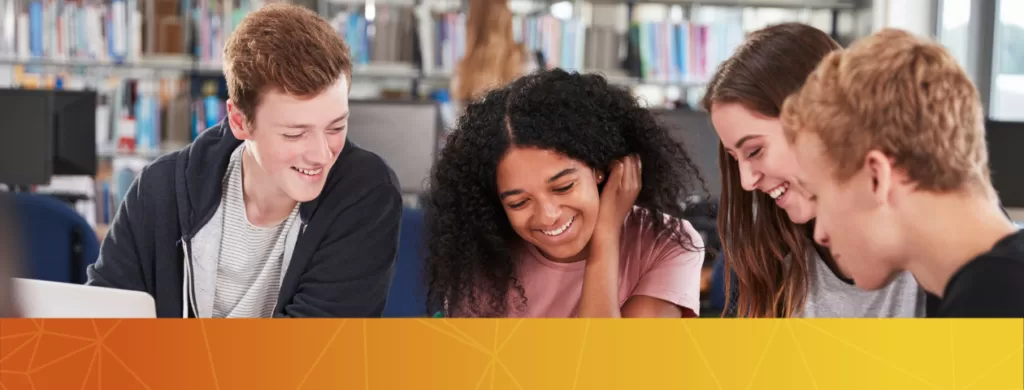
Universities are constantly striving to innovate and prepare for the future while navigating a post-COVID world, AI, and increased focus on sustainability. What are the key priorities identified by Reimaginers in shaping the strategies and activities of universities to implement the 2030 Agenda?
During an interactive panel at the QS Reimagine Education Conference, leaders in higher education participated in a forward-thinking session, gathering valuable input through a survey and live poll – aiming to shape an agenda that fosters innovation, inclusivity and lifelong learning for our education roadmap.
“I feel like if there’s not a conversation at the university board about how we should reinstate, re-energise or build trust in us and what we do, I worry about the future of education.”
Trust and impact
When thinking about the top priorities in helping higher education strive in 2030, Patrick Brothers, Co-Founder of Holon IQ, kicked off with what he felt to be the most “fundamental priorities” for institutions – earning trust and delivering impact.
“Trust is in decline and there are many alternatives forming around it which seem cheaper, faster and some say better. There is this organisational group which are fundamental and critical to our nation’s thinking and learning. To be able to be that, we need trust and impact and I feel like if there’s not a conversation at the university board about how we should reinstate, re-energise or build trust in us and what we do, I worry about the future of education.”
Amy Baker, CEO at The PIE also agreed: “In the UK, we have seen a lot of universities try and advocate for their civic impact. Elections are upcoming and education is often something that is clamped down upon – Understanding the broader economic and civic impact is really important.”

Inclusivity
Amy also adds “accessibility” as part of the priority list: “Accessibility can be around how we learn in terms of hybrid and flexibility – there are increasingly students who are lifelong learners. But also, accessibility meaning access for disability people which is sometimes forgotten in the broader conversation around education, technology, innovation and progress. We still have huge amounts of students and potential students who aren’t even able to access education.”
Digital competence
Amy emphasised that “digital natives” are higher education’s next cohort, and so are the future of our sector.
“They are helping inform the agenda about how they want to learn, who they want to learn with, and global corporations have as much resonance now as some university brands. I think we’re seeing that in the way new aspiring higher education students, who are currently teenagers, are thinking about their progress and opportunities.”
“Young people are demanding climate education and understanding of their future world to be a part of the curriculums.”
Environmental literacy
In the QS International Student Survey 2023, it was revealed that 41% of international prospective students actively researched the environmental sustainability strategies or efforts of institutions when considering them. However, a notable finding was that 44% of respondents were only ‘somewhat satisfied’ with the efforts displayed when researching the environmental strategy of institutions.
This data indicates that while students are aware of the efforts made by universities, there is still room for improvement in the satisfaction levels.
Another speaker on the panel, Zubair Junjunia, Founder at ZNotes, spoke about ensuring that the teaching of “climate education” is progressive: “The only thing I remembered in school was global warming, and we just moved along. In that much time, we’ve really not taught our young people the reality of changing industries and the green skills that they require.
“Young people are demanding climate education and understanding of their future world to be a part of the curriculums. But it also recognises that curriculums need to be adapted continuously to serve and equip young people to be resilient in a world that’s ever-changing.”
Student engagement
As we already know, the demands of modern life can take a toll on students – Dr Bashar El-Khasawneh, Associate Professor of Mechanical Engineering at Khalifa University, mentioned the importance of fostering “student motivation” in their learning journey.
“We have to motivate students to be good learners from day one. We have to intertwine entrepreneurship – not only as an explicit class, but it has to be intertwined within the education system at different levels and that will ignite the spark for students to be better learners.”
“Students have legitimate and fearful concerns, and we have to help them overcome this by providing them with the tools to adapt for future challenges.”
Skill enhancement
The QS Global Employer Survey 2023 reveals a significant disparity between employers’ perceived importance of a skillset and their satisfaction with it – particularly in ‘resilience and flexibility’ with nearly a 15% skills gap.
The current educational focus on technical skills such as coding and data sciences may be overlooking equally important yet softer skills like resilience and flexibility. This highlights the pressing need for curriculums to adopt a more balanced approach to skill development, incorporating both hard and soft skills.
Dr Khasawneh reinforced the importance of “skills development” in universities: “With all the issues the world is facing, we have to create a resilient, flexible and adaptable student. AI and robotics are shrinking the job market – students have legitimate and fearful concerns, and we have to help them overcome this by providing them with the tools to adapt for future challenges.“
Promoting innovation
In a rapidly evolving educational landscape, with unprecedented responsibilities for stakeholders and educators, Dr. Khasawneh discussed the need for recruiting more entrepreneurial role models.
“Right now, the sector is very traditional, and we would like to see more faculty members as business owners – we should set up a training system for these staff to be ready and able to start their own businesses. Not as a spin-off, but to encourage students to have their own start-ups.”
Charting paths
What solutions do we have for achieving the 2030 higher education agenda? Dr. Shadi Hijazi, Principal Consultant at QS, encapsulated the solution with “partnership”.
“When I think about some of the problems that are rising to the front – innovation in the classroom needs investment. We have seen it through events such as COVID and ChatGPT – research is fundamental to solving the world’s problems and it cannot be done in isolation. It has to have partnership across sectors and partnership across organisations.
“If you look at how QS is shifting the ranking methodology over the last couple of years, you see sustainability and international research network coming front and center. Sustainability is something that students really care about – environmental, social and governance. You don’t have to focus your partnerships with the top universities in the ‘advanced’ world only. If you are advanced enough, you have a duty to the world to collaborate with us and that’s how you solve the problem.”



